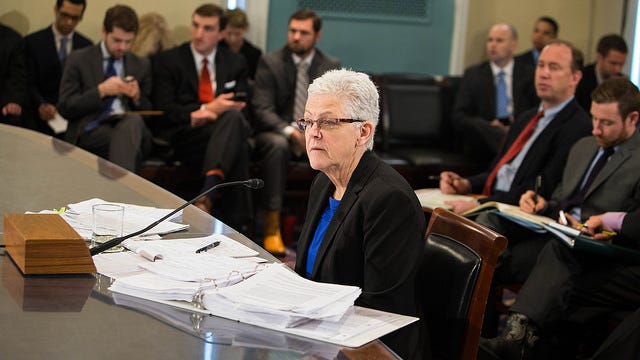House Agriculture Committee holds three-hour hearing questioning EPA administrator on EPA water rule, pesticide permits and more.

The House Agriculture Committee held a hearing Thursday to consider the impacts of the Environmental Protection Agency’s actions on the rural economy.
Members questioned EPA Administrator Gina McCarthy for three hours on the what committee chairman Michael Conaway (R., Texas) called “regulations and policies that are burdensome, overreaching and that negatively affect jobs and the rural economy” such as the “waters of the United States” rule, proposed changes to the ozone standard and pesticide uses and many more.
Conaway called EPA’s waters of the U.S. rule a “power grab” and said it's “not about clean water.”

EPA administrator Gina McCarthy was questioned for 3 hours Feb. 11 by the House Agriculture Committee on her agency's actions on several topics including the waters of the U.S. rule, pesticide permits, RFS and the relationship she holds with farmers. Source: House Agriculture Committee
“This rule is simply the result of EPA ignoring stakeholders, including states, other federal agencies and the American people, in order to egregiously and vastly expand its jurisdiction. This rule is already tied up in the court system, and I would imagine it will be there for many years,” Conaway said in his opening statement.
During questioning, McCarthy again noted that the agricultural practices previously exempt would continue to be so. Specifically Rep. Tim Walz (D., Minn.) asked McCarthy to clarify how her agency’s claim of the new rule increasing waters considered jurisdictional by 3-5% with another statement commonly said by her, “If you didn’t need a permit before you won’t need one now.”
McCarthy said the increased jurisdiction is in regards to direct hydrological connects, however, “in the terms of the agricultural community, there is no added permit burden.” She also clarified that her understanding is that plowing would be exempt under 404 permitting exemptions.
In response to a question by Rep. Walorski (R., Ind.), McCarthy admitted that landowner questions of jurisdiction over waters must be considered by the government, which was a contradiction to earlier statements that the ditch exemptions were automatic.
“The way in which the law works is that if there is a question that you’re going to be destroying or polluting what might be a water, … the individual landowner might be concerned that their activity would be doing that and that they may need a permit … on their private land or elsewhere; then, that question is raised by that landowner, and they ask the appropriate questions, that usually and often goes to USDA or others and filters its way through.”
During the course of the hearing, McCarthy was repeatedly questioned about her agency’s violation of the anti-lobbying provision of the federal rule-making process. Despite the fact that the Government Accountability Office (GAO) found that EPA violated these provisions, McCarthy maintained that her agency acted within the law.
Rep. Bob Gibbs (R., Ohio) claimed that the inspector general’s determination that EPA used covert propaganda is a “big deal and goes to the integrity of the whole stakeholder process.” The GAO found EPA’s use of Thunderclap for social media, which allows retweets not to be known by those retweeting it, was not permissible.
McCarthy was also questioned about the renewable fuel standard and current levels set by EPA. She said she anticipates that the 2017 rules will not be delayed, especially as biodiesel levels were already proposed to try to get the agency back on track. She continued to defend the current levels set on a trajectory that provides for steady growth but also takes into account the current market situation where little cellulosic ethanol is available.
About the Author(s)
You May Also Like



.png?width=300&auto=webp&quality=80&disable=upscale)

